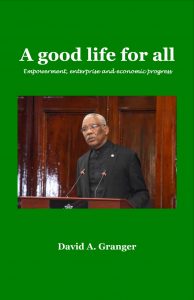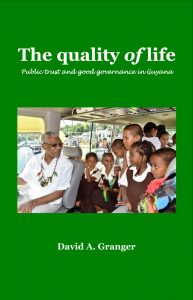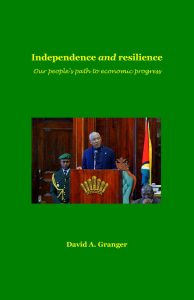 A review of six books by David Granger ? A good life for all: empowerment, enterprise and economic progress; Democracy and development: Guyana’s path to prosperity; Independence and resilience: Our people’s path to economic progress; The quality of life: Public trust and good governance in Guyana; The common good: Working together to achieve the good life for all; and, Secure borders: Guyana’s borders with Venezuela and Suriname.
A review of six books by David Granger ? A good life for all: empowerment, enterprise and economic progress; Democracy and development: Guyana’s path to prosperity; Independence and resilience: Our people’s path to economic progress; The quality of life: Public trust and good governance in Guyana; The common good: Working together to achieve the good life for all; and, Secure borders: Guyana’s borders with Venezuela and Suriname.
The Constitution of the Cooperative Republic of Guyana confers on the President the right to address the National Assembly on matters of national importance. It is a prerogative which was exercised, sparingly, until David Granger’s election as the country’s 9th Executive President.
 President Granger has been exceptional in exercising this right to address the National Assembly on no fewer than eight occasions during his first tenure – a record unmatched by any other Executive President. This number would have been greater were not for the dramatic events of 21st December 2018 in the Assembly when the country was thrown into constitutional controversy.
President Granger has been exceptional in exercising this right to address the National Assembly on no fewer than eight occasions during his first tenure – a record unmatched by any other Executive President. This number would have been greater were not for the dramatic events of 21st December 2018 in the Assembly when the country was thrown into constitutional controversy.
The President’s collection of six books recounts his addresses to the National Assembly. These, without doubt, are among the finest presentations ever made by a Head of State in the country’s parliamentary history. That fact makes these six books a prized collection. They are rich in policy-making but of much greater value is the precedent which the President set in his regular engagements with the National Assembly.
Democracy and development: Guyana’s path to prosperity, is the title of the President’s inaugural ‘Throne Speech’. It would be normal, in other jurisdictions, for a President, upon assuming office, to address the National Assembly about his country’s plan for the next five years and to detail his Government’s prospective legislative agenda. The President outlines a lively programme in it aimed at defeating what he has referred to, elsewhere, as the ‘four horsemen of the Guyanese apocalypse’ – crime, disease, ignorance and poverty.
The President lays out an ambitious but attainable agenda. The book is declaratory, rather than expository, for the most part. The book reads, stylistically, like a political manifesto employing, pointedly, expressions such as “Your government will” and “Your government seeks”, etc.
 The book disappoints in one glaring respect: it commits the error of avoiding addressing, substantively, race relations and shared governance – two issues which have been viewed as the central to the goals of national unity and national development. The President feels more comfortable, instead, in promising to work “towards achieving national unity and making Guyana ‘One Nation’”.
The book disappoints in one glaring respect: it commits the error of avoiding addressing, substantively, race relations and shared governance – two issues which have been viewed as the central to the goals of national unity and national development. The President feels more comfortable, instead, in promising to work “towards achieving national unity and making Guyana ‘One Nation’”.
The President, following his maiden ‘Throne Speech’ made it his duty to address the National Assembly, unfailingly, at the commencement of every Session. If the ‘Throne Speech’ had a five-year focus, the annual addresses at the commencement of each sitting, allowed him to enunciate his Government’s plans for the coming fiscal year.
Independence and resilience: Our people’s path to economic progress, was the title of his address to mark Guyana’s celebration of its 50th anniversary of Independence in 2016. President Granger, in preparation for the country’s Jubilee year, addressed the National Assembly on 14th January 2016. It is an invaluable research resource which recounts, essentially, the nation’s economic progress since Independence. The book also details the broad steps which his administration proposed to undertake to build a more resilient economy so as insulate it from the threats – international and local, environmental and economic – which put a brake on national development.
President Granger is forward-looking. He did not harp on past mistakes or missteps – including past governments pursuit of an alien ideology. The need to realise the nation’s unfulfilled aspirations were implied, clearly, in his suggestion that it was time for a fresh start and for the redoubling of efforts to reduce poverty. The quality of life: Public trust and good governance in Guyana, is the text of the President’s address at the commencement of the 43rd Sitting of the 11th Parliament on 13th October 2016. The book’s title expresses its primary focus – improving the quality of life of citizens by increasing public trust between the governed and the Government.
 The President launches a broadside against his political rivals, accusing them of turning dreams of a good life at the turn of the millennium into a horrible nightmare which he labelled ‘The Troubles’. The President, known to be decorous, decent and dignified in his political engagements, revealed a combative side as he attacked the PPPC’s record in office and that party’s legacy of maladministration.
The President launches a broadside against his political rivals, accusing them of turning dreams of a good life at the turn of the millennium into a horrible nightmare which he labelled ‘The Troubles’. The President, known to be decorous, decent and dignified in his political engagements, revealed a combative side as he attacked the PPPC’s record in office and that party’s legacy of maladministration.
He went on to outline a remarkable plan which he called the ‘green agenda’, aimed at promoting ‘green’ economic sectors, ‘green’ growth and ‘green’ employment. The book introduces President Granger’s ‘green’ development agenda and the international obligations to be satisfied under that agenda. It addresses, also, developments in the fields of public infrastructure, public services, public security and integrity in public life all of which were deemed integral to ensuring public trust and, consequently, for improving citizens’ quality of life.
The common good: Working together to achieve the good life for all is a virtual mid-term report card of the Government. President Granger details the his Government’s achievements in his address to the 71st Sitting of the 11th Parliament on the 2nd November 2017. The book is striking for detailing how much the Coalition administration was able to achieve during its first two and one half years in office. The book is noteworthy for the enumeration of an impressive list of accomplishments aimed at improving citizens’ living standards. The President was able to present evidence of development in every sphere of governance – including foreign relations; natural resource and economic management; agricultural, business, community rural and hinterland development; public infrastructure; public telecommunications; transparency and accountability; housing; public education; public health and public security.
It was unfortunate that the rich presentation of the President’s address were overshadowed by the distasteful and rowdy protests by the Opposition within the Assembly. The protests caught the Government side of the House by surprise but failed to faze the President.
A good life for all: Empowerment, enterprise and economic progress, is the text of President Granger’s last address to the National Assembly on 18th October 2018 before the dissolution of Parliament on 30th December 2019. It was a confident and assured presentation. The President could hardly have an inkling then that his Coalition would have faced, and lost, a no-confidence motion two months later.
 The address covered the main themes – public education, public health, sanitation, housing, water, social protection, agriculture, youth employment, public security, citizenship and public security. The emerging oil and gas sector, by this time, was seen as having transformative potential and the President was keen to emphasize his administration’s preparation for first oil. Here was a President at the peak of his game and not expecting the betrayal of two months later.
The address covered the main themes – public education, public health, sanitation, housing, water, social protection, agriculture, youth employment, public security, citizenship and public security. The emerging oil and gas sector, by this time, was seen as having transformative potential and the President was keen to emphasize his administration’s preparation for first oil. Here was a President at the peak of his game and not expecting the betrayal of two months later.
Secure borders: Guyana’s borders with Venezuela and Suriname is the text of one of two special addresses which the President made to the National Assembly. The book goes beyond recounting the various acts of aggression against Guyana. It dissects the spurious claims – such as the ‘Chavez doctrine’ – and other factors which ignited these acts of provocation.
These presidential addresses set an important precedent in engagements between the President and his country’s National Assembly. For all the criticisms which have been leveled against the President and his Government over their arithmetical gymnastics and alleged specious challenges to the no-confidence motion, this six-book collection represents indisputable evidence of a leader who has been highly respectful of parliamentary democracy and who set an exemplary and unsurpassed record of engaging regularly with the National Assembly on matters of national importance.




.png)









